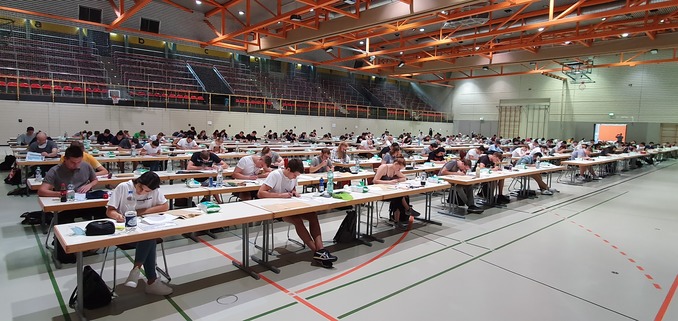Aalen University looks back on its first Online SemesterAround 80 percent of students managed to navigate the digital lectures, but still personal contact is missing

In the times of Corona, the examinations demand large spaces: Aalen University students at an in-person examination in the Ulrich-Pfeifle Hall. Photo: Volker Knoblauch
The publication of the examination results marked the end of a very special summer semester 2020 for the students and teachers at Aalen University. Due to the Corona pandemic, all student functions were transferred to online platforms in record time. “Thanks to many creative ideas and fantastic engagement, we successfully mastered the first completely digital semester in the history of Aalen Unviersity”, summarizes University President Prof. Dr. Gerhard Schneider.
From in-person lectures to online, and only within a few weeks: summer semester 2020 brought challenges for both students as well as for the teachers and faculty. The situation demanded innovative solutions, new developments in digital formats and additional opportunities for exchanging ideas. “In this special semester, Aalen University proved itself to be very flexible and adaptable, without losing its participants along the way”, says Andreas Raab, president of the student representative organization (VS) at Aalen University.
Around 78 Years of Video Conferences
The numbers also prove how much work was put into the semester: summer semester 2020 included 39,532 video meetings through the tool “Zoom” with a total of 490,563 participants and a total runtime of around 78 years. Over 5,000 participants used Aalen University’s learning platform Canvas. And the diversity of examinations has never been greater – from in-person examinations in the Ulrich-Pfeifle Hall to laboratory projects under strict safety requirements to online examinations. Despite the Corona pandemic, the average marks of the students were around the same level as the previous semester, so that the semester can be considered successful.
„The semester was an adventure for all of us. But together, we overcame it with our efforts and flexibility. We can be proud of that”, emphasizes President Schneider. In addition, the past months have also proven that digital teaching also offers many additional opportunities. “These experiences have moved us forward – perhaps even by a few years”, resumes Schneider.
Social Contacts and Personal Interactions are Missing
The students also offered positive feedback. According to a current survey, around 80 percent of students were able to navigate online lectures well. Nevertheless, only every other student considered summer semester 2020 to be a valuable semester. Missing social contacts and interactions on campus were named as a decisive disadvantage of online lectures. “Because studies aren’t just about receiving knowledge, but also about developing your personality, the VS would like to stress out the importance of in-person lectures and of the commitment to return to them”, explains the VS-President Raab.
“The direct interactions between students, teachers and researchers is, and remains a fundamental aspect for successful studies. We are a nonvirtual university and will remain one as well”, emphasizes President Schneider. Nevertheless, the university is preparing for the event that student functions will still be restricted for the winter semester 2020/21. “We must find a balance between protecting everyone’s health and regular university functions. The students’ success should not be affected due to Corona protocols”, says Schneider. At the moment, he is expecting that between 20 and 30 percent of all university functions can take place directly on campus. “We are doing everything in our power to establish a smooth working environment for all lecturers and researchers. Naturally, however, we must take the official regulations and the connected hygiene protocols into account, which may mean that only a limited number of students can attend lectures at the same time”.
The university is paying special attention to the students in their first and second semester. These students are being given preferential assistance for in-person lectures, in order to help them begin their lives as students well. Seminars, laboratories and small lecture groups also have “priority” for in-person lectures. It is also important to promote the connections between the students, says Schneider. “But luckily for us, the students and teachers are very creative in that regard: From a digital camp for first-semester students to a Meet & Match or virtual beer nights, everything should be included there”.
